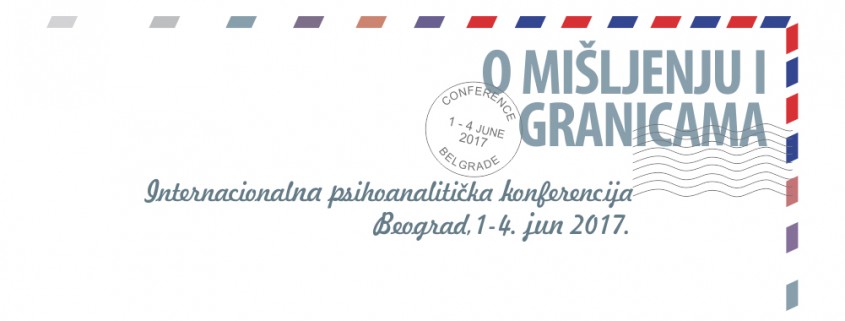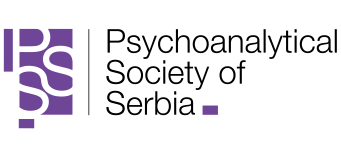International psychoanalytic conference Thinking on the Border, for the first time organised by twelve psychoanalytic societies from nine neighbouring countries, was held in Belgrade, from June 1st to June 4th. It is the beginning of future biannual gatherings; the next one is in Rome, 2019.

The conference is organised by
The Psychoanalytical Society of Serbia
Together with: Bulgarian Psychoanalytic Society Study Group, Croatian Psychoanalytic Society, Helenic Pychoanalytic Society, Hungarian Pychoanalytic Society, Istanbul Psychoanalytical Association, Istanbul Psychoanalytic Association of Training, Research and Development, Italian Psychoanalytical Association, Italian Psychoanalytic Society, Romanian Society of Psychoanalysis, Vienna Psychoanalytical Association, and Vienna Psychoanalytic Society.
Introductory speech of the President of the Psychoanalytical Society of Serbia, Jasminka Šuljagić:
Dear colleagues,
It is with great pleasure that we now welcome you to the Conference organised for the first time by twelve psychoanalytic societies from nine neighbouring countries.
We enjoyed the joint preparation of this event, and wish now to present a short video, made from the material sent to us, about all our societies. The video will be saved in the archive of this Conference.
We hope that this conference is a good opportunity for us to meet and think together about the theme which is both contemporary and ever-important.
Our borders have been changing throughout our history, and our histories have many lines of intersections. Our mutual field of psychoanalysis enables us to find a place for their owning and overcoming.
The topic of borders has multifaceted references; it diverges and spreads into many different areas and brings out their peculiarities. We can situate it in the realm of development, the first constitution of who we are, the land of me and the other, radical aloneness and infinite interrelatedness. It can be traced even further, to relations with all differences – seeing these as strange, alien, uncanny or as intriguing and rewarding.
Our hero, Oedipus, at the end of his life’s path, meets another hero – Theseus. Oedipus is aged, blind, outcast, homeless and polluted, and in this encounter he gains recognition, acceptance and a final resting place. Being a foreigner himself, Theseus accepts that which is foreign – in Sophocle’s drama, this is the way to preserve the city – “That way you shall forever hold this city“ (Oedipus at Colonus, 1533).
We are now in position to re-think the borders between body and mind, past and present, knowing and not-knowing, consciousness and unconscious-ness, inside and outside, as well as the concept of drives that relate to and define the boundary, or the frontier, between the mental and the somatic. Freud told us about the necessity of translating psychic material at the boundary of successive epochs of life, about our psychic mechanism that has come into being by a process of stratification. We may ask further about the borders of those strata of our mental life, about the process of differentiation and unification, about the transformation of borders into passages and the finding of gates, about movement and permeability. It might also be possible to follow the topographical point of view, the evolution of Freud’s thought about the flexibility of borders, the necessity of internal borders and differentiations; or take into account clinical disorders / borderline pathology; transitional space and phenomena, notes about an autistic-contiguous position and the skin as a boundary. Our history and our discipline, at the border with many others, enable us to consider various concepts and their relational lines.
Living on the boundary of epochs we are witnesses of a continuous refugee crisis – the movement from chaos, though extreme danger, into limbo as the border in every sense. Migration, language migration, the rise of ethnic hatred, totalitarianism, virtual versus actual, digital addictions, changes in the process of thinking itself – all are characteristic of contemporary times. Is this a polarized world, with divided parties, national borders, distances and gaps between cultures, languages, professions, classes, religions, but with a blurred border between terrorism and freedom of speech, the press and information, or a one-world society, globalized and homogenized?
In Medieval times the madman had the privilege of being confined within the city gates, as we heard: in the interior of the exterior and inversely, at the point of passage, the threshold itself, enclosed and excluded.
As analysts, we live simultaneously on many borders, both inside our therapy rooms and outside of them, often in no-man’s-land, thinking both sides together.
The main plenary lectures of the Conference, presented by Jorge Canestri (EPF, Italian Association), Alexander Uskov (Moscow Society) and Jonathan Sklar (British Society), will give us a view “from outside and from inside psychoanalysis”, an intimate world of an analytical relationship, and the huge world of societies we belong to, with its memory and its trauma. The afternoon part of the program will deal with the issues of spoken and unspoken, with the transgenerational aspects of migrations, and the boundaries between external and internal realities, through several panels and theoretical-clinical presentations. Yesterday afternoon candidates had the Candidates’ pre-conference day, with the round-table theme “Candidates on the border”and the peer supervision.
I would like to thank a lot to the Programme committee, for all the work we have done, our meetings and promotion of the conference: Atanassov Nikola (Bulgarian Psychoanalytical Society, Study Group), Stanislav Matačić (Croatian Psychoanalytic Society), Athanassios Alexandridis (Hellenic Pycho-Analytical Society), Zsuzsa Lőrincz (Hungarian Pychoanalytical Society), Zehra Ünsal (Istanbul Psychoanalytical Association), Gulgun Alptekin (Istanbul Psychoanalytic Association for Training, Research and Development – PSIKE), Jacqueline Amati Mehler (Italian Psychoanalytical Association), Tiziana Bastianini (Italian Psychoanalytical Society), Jasminka Šuljagić, chair (Psychoanalytical Society of Serbia), Gianina Micu (Romanian Society of Psychoanalysis), Fritz Lackinger (Vienna Psychoanalytic Association), and Christine Diercks (Vienna Psychoanalytic Society).
The local committee, Vesna Brzev-Čurčić, Vojislav Ćurčić, Mina Gođevac, Aleksandar Kontić, Tijana Miladinović, Jovana Mladenović, Marija Vezmar, Jasmina Vrbaški, Srđa Zlopaša, and all the members and candidates of the Psychoanalytical Society of Serbia, wish you fruitful work and and pleasant time here with us.
Programme
Thursday, June 1, 2017
Candidates’ pre-conference day
Round table discussion – “Candidates on the border”
Coffee break
Peer supervision
Welcome reception to the conference for all participants
Friday, June 2, 2017
First plenary on the main theme
Opening of the conference
Jasminka Šuljagić, PSS President, chair of the Programme Committee
To Think the Boundaries between Psychoanalysis and Other Disciplines and between Psychoanalysis and Reality
Jorge Canestri (EPF President)
Gianina Micu (Romanian Society of Psychoanalysis) as discussant
Chair: Gábor Szőnyi (Hungarian Pychoanalytic Society)
Post plenary discussion groups
Parallel panels on the main theme
Panel “ Crossroads of the spoken and the unspoken”,
Chair: Jacqueline Amati Mehler, Italian Psychoanalytic Association
Speakers:
Talking on the border: between transformations and betrayals, Fulvio Mazzacane, Italian Psychoanalytic Society
On the border between spoken and experienced: some reflections from analyses of the performing musicians, Aleksandar Kontic, Psychoanalytical Society of Serbia
Cultural differences between analysts and the analysand difficulties encountered during analysis, Ljiljana Milivojevic, Psychoanalytical Society of Serbia
Parallel panels, Clinical-theoretical presentations
1.
Chair: Nikola Atanassov, Bulgarian Psychoanalytic Societety
At the edge of the abyss: trauma, adolescent breakdown and identity in a case of failed adoption, Simona di Segni, Italian Psychoanalytical Association
Focusing on borders at the termination phase of psychoanalysis, Gulgun Alptekin, Istanbul Psychoanalytic Association for Training, Research and Development (Psike Istanbul)
2.
Chair: Massimo Vigna Taglianti, Italian Psychoanalytic Society
Skin as a boundary: analysis of a patient suffering from alopecia. Transference and countertransference considerations, Luigi Maccioni, Italian Psychoanalytical Association
Borders of the psychoanalytic frame: when the tear gas leaks into the room, Zehra Karaburçak Ünsal, Istanbul Psychoanalytical Association
Film presentation
Enclave (2015, Germany – Serbia) Moderator: Stanislav Matačić (Croatian Psychoanalytic Society) Guest: Goran Radovanović, film director
Saturday, June 3, 2017
Second plenary on the main theme
Alexander Uskov (Moscow Psychoanalytic Society)
Giovanna Ambrosio (Italian Psychoanalytical Association) as discussant
Chair: Maria Chatziandreou (Helenic Pychoanalytic Society)
Post plenary discussion groups
Parallel panels on the main theme
Panel ’Transgenerational impact of migration’, Saturday
Chair: Lorincz Zsuzsa, Hungarian Psychoanalytical Society
Abandonment of individuality for the benefit of the group, Ayla Yazıcı, Istanbul Psychoanalytic Association for Training, Research and Development (Psike Istanbul)
Here, there, everywhere and nowhere, Vesna Brzev-Ćurčić, Vojislav Ćurčić, Psychoanalytical Society of Serbia
Beyond the water. Being a third generation Bosnian psychoanalyst in Turkey, Yavuz Erten, Istanbul Psychoanalytic Association for Training, Research and Development (Psike Istanbul)
Panel,
Chair: Fritz Lackinger, Vienna Psychoanalytical Association.
Speakers:
At the borders of reality, Pinar Padar, Istanbul Psychoanalytic Association
Crossing the border between internal and external reality, Marianne Scheinost-Reimann, Vienna Psychoanalytical Association
From the body to the “here and now”, Phd Bogdan Sebastian Cuc, Romanian Society of Psychoanalysis
Sunday, June 4, 2017
9:00 – 10:30
Third plenary on the main theme
THINKING on the BORDER. Memory and Trauma in Society
Jonathan Sklar (British Psychoanalytical Society)
Christine Diercks (Vienna Psychoanalytic Society) as discussant
Chair: Oleg Filipović (Croatian Psychoanalytic Society)
Post plenary discussion groups
Closing the Conference
(video) https://fb.watch/9b56k6ZX-c/
Farewell cocktail


